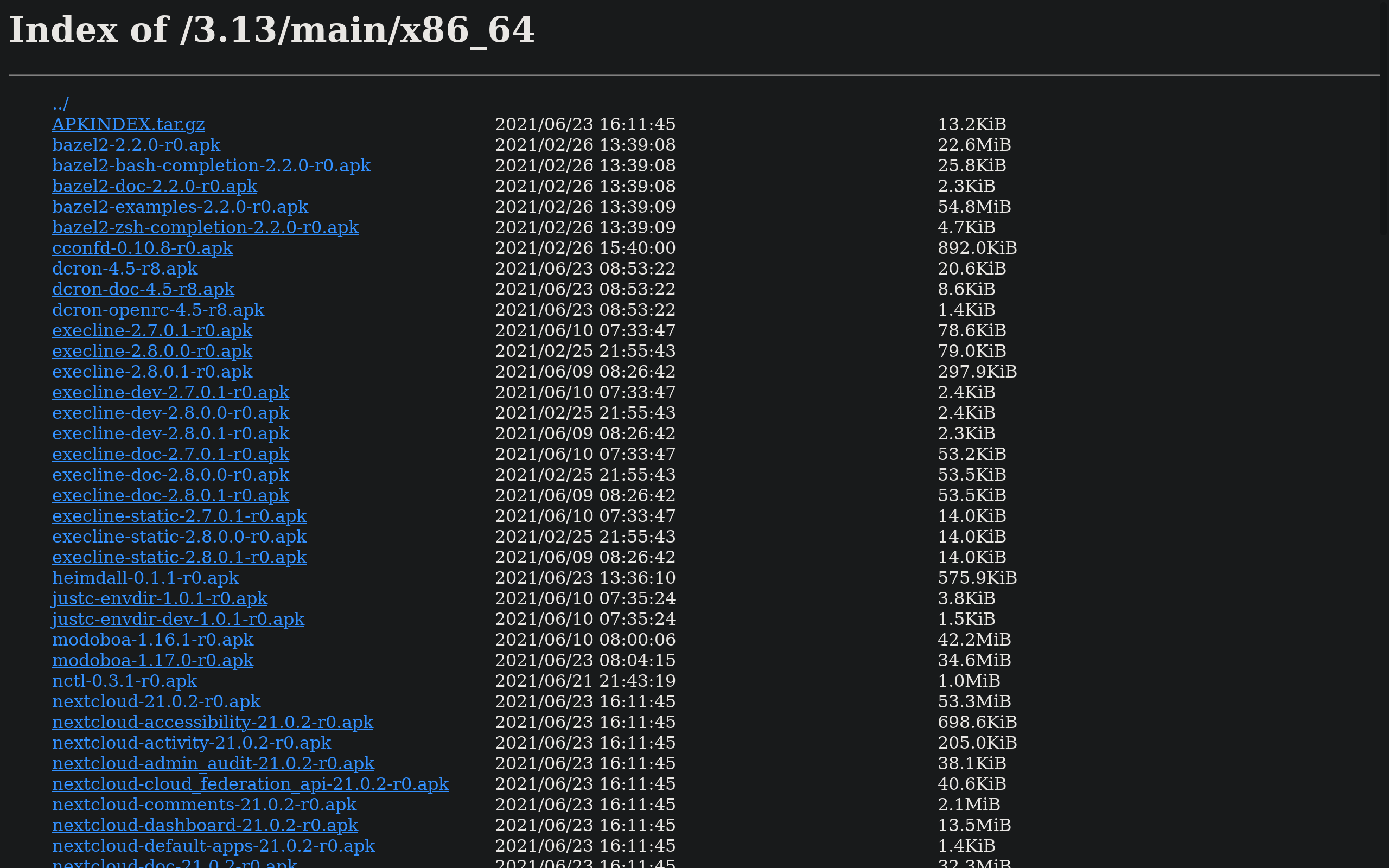Simple alpine Linux packages server you can use to consume and update your private packages in CI/ CD pipelines.
[TOC]
reposerve is a simple alpine Linux packages HTTP(S) server you can
use to consume and update your private packages in CI/CD pipelines. Written in async rust, it acts
as a simple static file server with an API protected by a JWT Token to easily upload new packages.
You can follow the tutorial [Building Alpine Linux packages inside a container](https:// itsufficient.me/blog/alpine-build) to understand what issue it tries to resolve and read A better way to build containers images to see how I integrated alpine packages in the fabric of container images with CI/CD pipelines.
reposerve 0.7.0
Usage: reposerve [-c <config>] [-d] [-v] [-l <addr>] [-L <addrs>] [-S]
Simple Alpine Linux packages server
Options:
-c, --config configuration file (/etc/reposerve.yaml)
-d, --dev dev mode: enable /webhook and /upload without jwt (false)
-v, --verbose more detailed output (false)
-l, --addr addr:port to bind to (0.0.0.0:8080) without tls
-L, --addrs addr:port to bind to (0.0.0.0:8443) when tls is used
-S, --secure only bind to tls (when tls config is present in
configuration file)
--help display usage information
Uploading packages is easy and can be done with curl. You just have to get a JWT token. version
is the alpine version (edge), repo is the repository name (main) and arch (x86_64) are all
optional. You can submit multiple apk file.
This is for example a script that will upload all files to a reposerve service on $HOST under GitLab
(using the job JWT token).
#!/bin/sh
. /etc/os-release
VERSION=${VERSION_ID%.*}
REPO="$(basename $(dirname $(pwd)))"
DIR=${1:-/tmp/apkdeploy}
for arch in "$(find $DIR -name APKINDEX.tar.gz)"; do
ARCH="$(basename $(dirname $arch))"
args="-H 'Authorization: Bearer $CI_JOB_JWT_V2' -F 'version=$VERSION' -F 'repo=$REPO' -F 'arch=$ARCH' "
for file in "$(find $DIR -name '*.apk')"; do
args="${args}-F file=@$(basename $file) "
done
(cd "$(dirname $arch)" && eval curl $args https://$HOST/upload)
doneAfter an upload, the index is automatically reconstructed and signed by reposerve (no need to define
extra webhook).
A jwt configuration has to be provided in the configuration for the /upload and /webhooks
unless the dev mode is activated. You need to give the URL to retrieve the public keys (jwks) that
sign the JWT Tokens and a map of claims with their expected values the token must comply with, to be
allowed to upload files to the repository.
redirect allows to configure an automatic HTTPS redirection per protocol to deal with
differences in dual stack deployment. Generally you use a reverse proxy with IPv4 while you
expose your service directly with IPv6. Because some reverse proxy don't handle TLS encrypted
upstream you can't send them a redirect, so you can disable it in that specific case.
When hsts is provided, then HTTP Strict Transport
Security
are sent according to the parameters.
dir: /home/packager/packages
tls:
crt: /var/run/secrets/reposerve/tls.crt
key: /var/run/secrets/reposerve/tls.key
# perform a redirection to https
redirect:
port: 443 # optional
protocols: both # both | ipv4 | ipv6 | none
# Strict-Transport-Security header
hsts:
duration: 300 # duration in s
include_subdomains: true
preload: false
# protect /upload and /webhooks with a JWT token
jwt:
jwks: https://gitlab.com/-/jwks
claims:
iss: gitlab.com
# webhooks definition under /webhooks/..
webhooks:
sign: /usr/bin/apk_sign.shtls, redirect, hsts, jwt and webhooks are all optional. Be careful when deploying
in production
